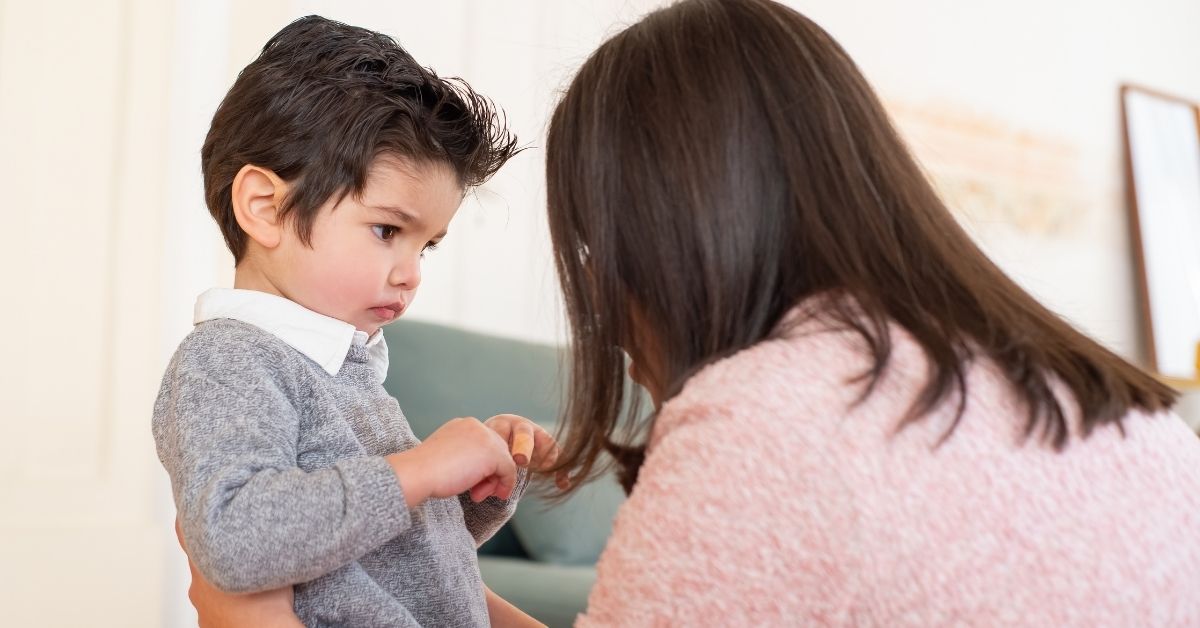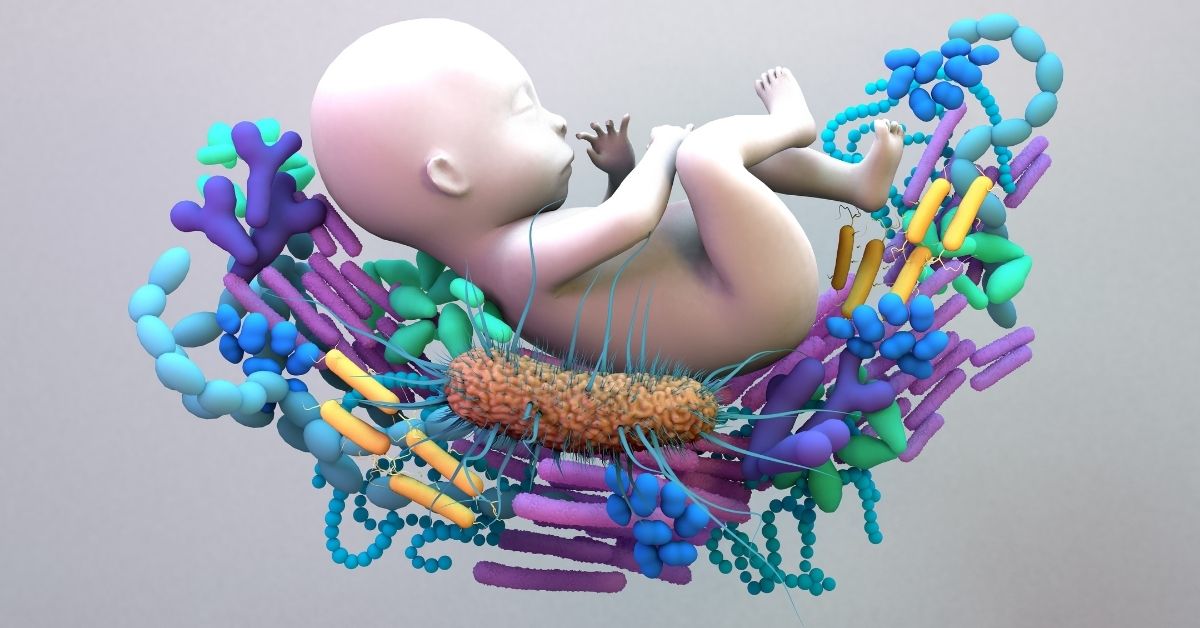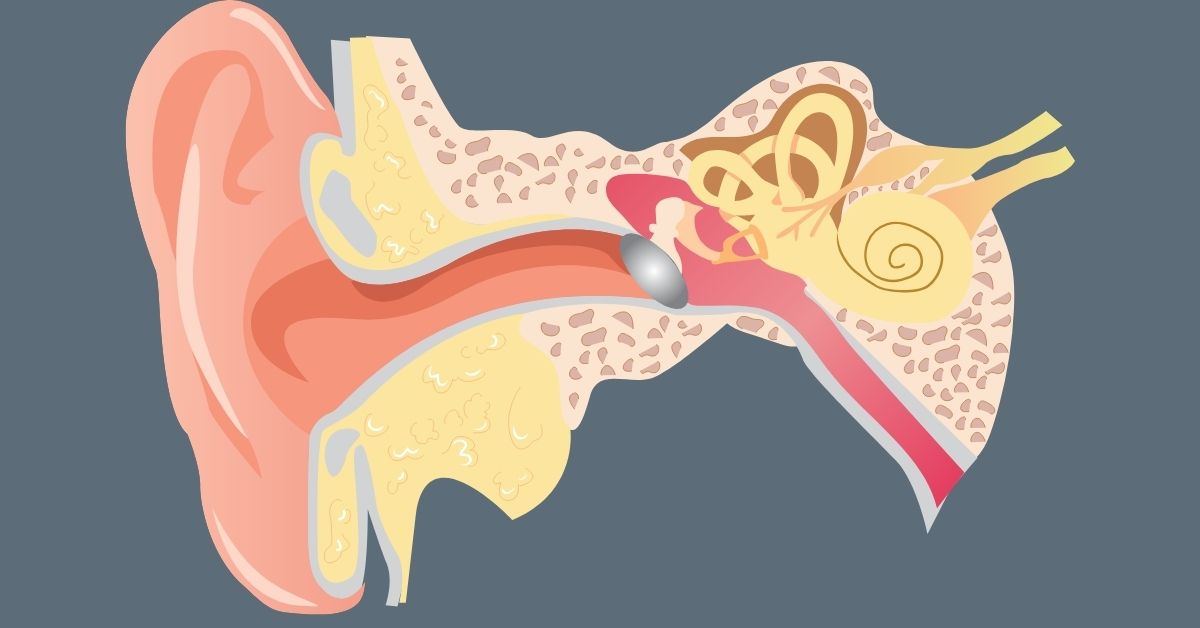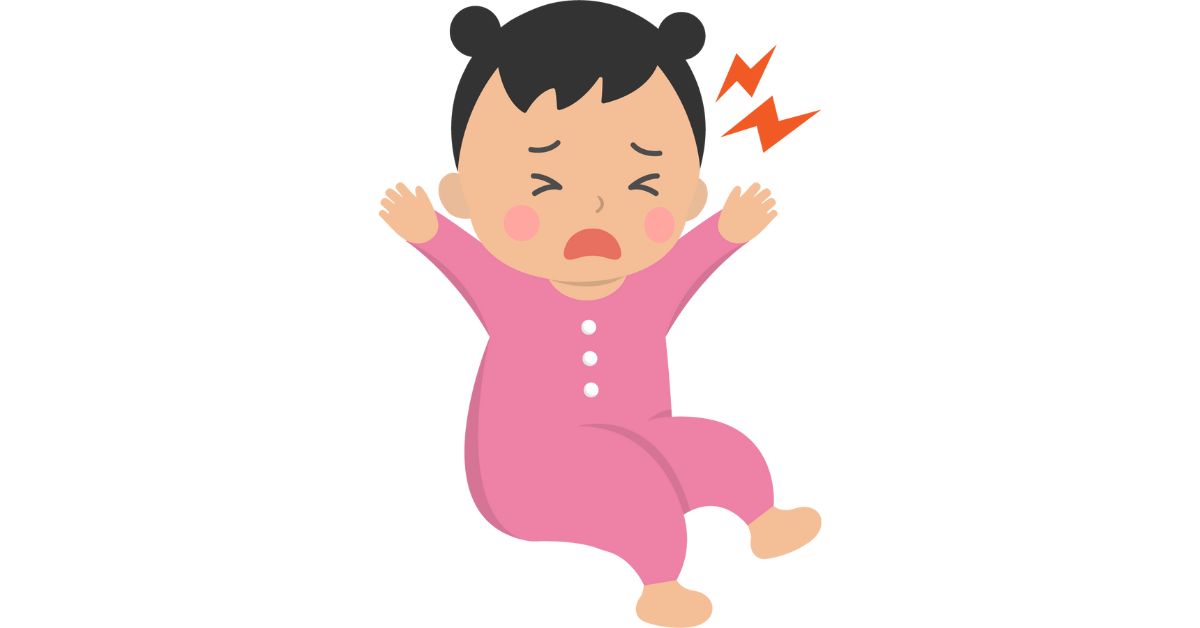In this article:
- Talking to Your Child about Coronavirus – 10 Tips to Help You Talk to Your Kids About COVID-19
- Tip 1: As best you can, remain calm.
- Tip #2: How to talk to your kids.
- Tip # 3: Find out what your kids know about the virus and where they are getting their information.
- Tip #4 Remind your kids what they, and you, as a family, can control.
- Tip #5: Stick to regular routines as much as possible
- Tip #6: Regularly monitor how your kid is processing any worry or anxiety.
- Tip #7: Do not blame or stigmatize others
- Tip #8: Be ready to answer questions about kids getting sick.
- Tip #9: Honesty is the best policy when it comes to the question of death.
- Tip #10: It’s ok if you don’t have all the answers.
As a parent, we always wonder how to tell a new thing to our kids or answer their questions about things happening outside. These days, almost all of us are struggling to find the perfect answer to How to talk to kids about the Coronavirus COVID-19. I asked my five-year-old daughter a few days ago if she had any questions about the coronavirus, and she replied, “Are people going to die?”
In this article:
- Talking to Your Child about Coronavirus – 10 Tips to Help You Talk to Your Kids About COVID-19
- Tip 1: As best you can, remain calm.
- Tip #2: How to talk to your kids.
- Tip # 3: Find out what your kids know about the virus and where they are getting their information.
- Tip #4 Remind your kids what they, and you, as a family, can control.
- Tip #5: Stick to regular routines as much as possible
- Tip #6: Regularly monitor how your kid is processing any worry or anxiety.
- Tip #7: Do not blame or stigmatize others
- Tip #8: Be ready to answer questions about kids getting sick.
- Tip #9: Honesty is the best policy when it comes to the question of death.
- Tip #10: It’s ok if you don’t have all the answers.
For some time now, our daughter has asked us a lot of questions about death. She’s the type of kid, who from time to time, will spontaneously walk up and ask for a hug. When you ask her what is wrong, she tells you with tears in her eyes, “I don’t want you or mom to die.”
So, while her question didn’t necessarily surprise me, I also felt unprepared in how to respond to her questions about the coronavirus. COVID-19 is going to be with us for the foreseeable future, so we parents need to know how to respond to our children’s questions and needs. Below are 10 tips I am using to talk to my daughter about the coronavirus outbreak.
Talking to Your Child about Coronavirus – 10 Tips to Help You Talk to Your Kids About COVID-19
Tip 1: As best you can, remain calm.
Our kids are wired to observe how we react to stress. In all the ways we protect them because of the virus, we are also vulnerable. Being bombarded daily with new information, helpful and unhelpful advice from family and friends, and a changed routine are all challenges we are reacting to in real-time. Here are a few tips on how to remain calm:
- Check-in with yourself daily. Each day examine how you feel and respond to your needs as best you can. If you’re feeling anxious, take some time for yourself. While most of us will undoubtedly spend more time at home with our kids, we can’t be “on” all the time.
- Don’t go through this alone. Reach out to other parents, friends, or family members whose advice you respect and trust. Skip the crazy friends on WhatsApp or Facebook who keep posting unhelpful memes.
- Take care of yourself. Exercise, eat healthily, get your sleep, meditate. The point is, we respond better to our needs and the needs of our kids when we are on top of our physical and mental game.
Tip #2: How to talk to your kids.
Here are a few tips on how to approach them:
- Fake it until you make it. If you don’t feel calm or confident, that’s ok and perfectly natural, but, as best you can, try to be calm when interacting with them. Again, take some time, and do some activities to help you also find your center.
- Don’t minimize their concerns. Not reducing or outright ignoring our kids’ concerns can feel counter-intuitive for some of us. We want to protect our kids from the dangers in the world. But we don’t want to minimize their concern, especially if it means not providing them with accurate information. The point is, we can give them accurate information and also help them through this difficult time.
- Ask age or developmentally appropriate questions. While older kids may have specific questions like, how long does it take for scientists to develop a new vaccine for a virus, younger kids may ask, what is a virus? Each kid is different, so think through how your kid processes information before talking with them about the virus.
- Follow their lead. A most important step, LISTEN. Not filling my daughter with the information that I think she needs is a hard one for me. If your kid doesn’t have many questions, that’s ok, that’s why we are checking in periodically. If you continue the conversation, you run the risk of overwhelming them with more information and adding or creating fear.
Tip # 3: Find out what your kids know about the virus and where they are getting their information.
We can’t know how to respond to our kids’ needs if we can’t ascertain what they know about the virus. Nor can we protect them from misinformation until we know where they are getting their information. Here are a few tips to help you figure out what your kid’s baseline understanding of COVID-19 is and where that baseline comes from:
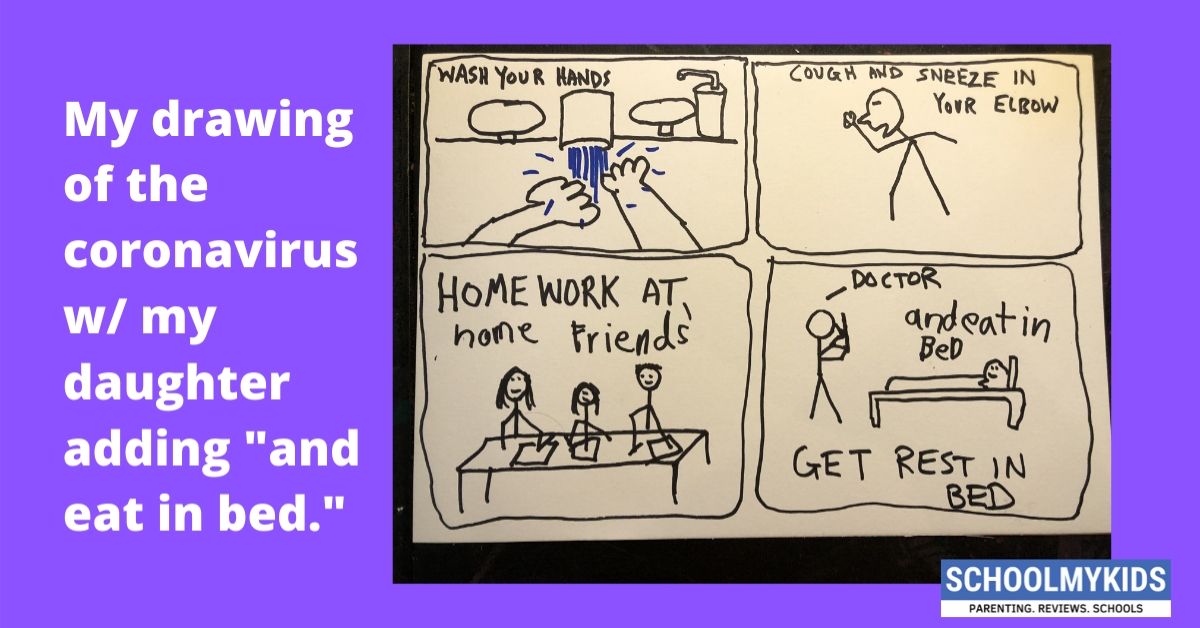
- Ask them open-ended questions. Let your kids lead the conversation. Asking clarifying questions is the best way to go once they are sharing.
- Have them draw a picture of the virus. This is a great exercise to do together. We did this together and had a great discussion. (See picture)
- Where are they getting their information? Ask them, for example, what have they learned about the virus from their teachers, family members, adults, their friends, and the media, including tv, radio, and online.
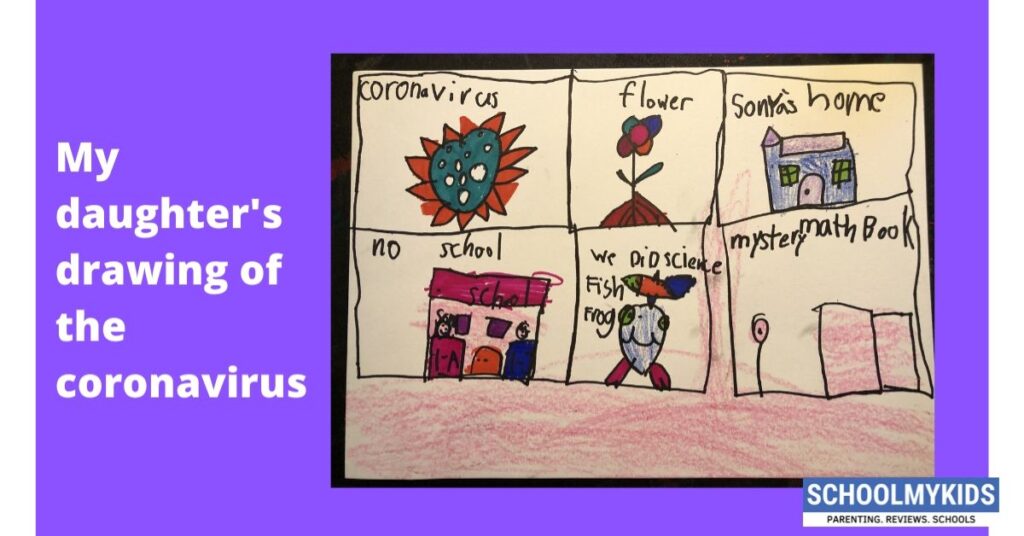
Tip #4 Remind your kids what they, and you, as a family, can control.
Too often, the fear associated with an event like COVID-19 cuts us off from realizing what we can control. It is helpful to remind our kids what you are doing as a family to keep them safe. Here are a few tips to help you establish that your kids and family do have some control over the situation:
- Wash your hands together. This is an opportunity for you to be a good role model, ensure your family is washing their hands properly, and remind them that the only way they can catch the virus is through their mouth, nose, or eyes. The more we wash and not touch our face, the more difficult it is to catch the virus.
- Stay close to home. As governments close more and more public places as the virus spreads, help your kids understand that the closer they stay to home, the more difficult it is to catch the virus.
- Share with your kids what is happening to help keep people safe: Let them know doctors, nurses, and hospital staff are working hard to make sure everyone who catches the virus can get the medical help they need. You can also let them know that scientists are tirelessly working to find a vaccine for the virus.
Tip #5: Stick to regular routines as much as possible
One of the most disruptive aspects of the virus is how much our daily lives change. All of us, especially our children, thrive when we have a daily schedule and engage in our everyday routines. Each day we don’t go to school, refrain from leaving the house, or wash our hands for the tenth time, is a reminder of the virus and our past, carefree life and routines. So, as we work to help our kids cope and relax, as best we can, try to keep to your regular routines and schedules. To help our family, we’ve come up with a new daily schedule (see picture) for the weeks our daughter will be out of school. Each day we review the plan in the morning as a family and refer back to the schedule throughout the day. It’s brought a lot of order to what previously seemed like long and open-ended days. We’ve had a lot of success with our new schedule.
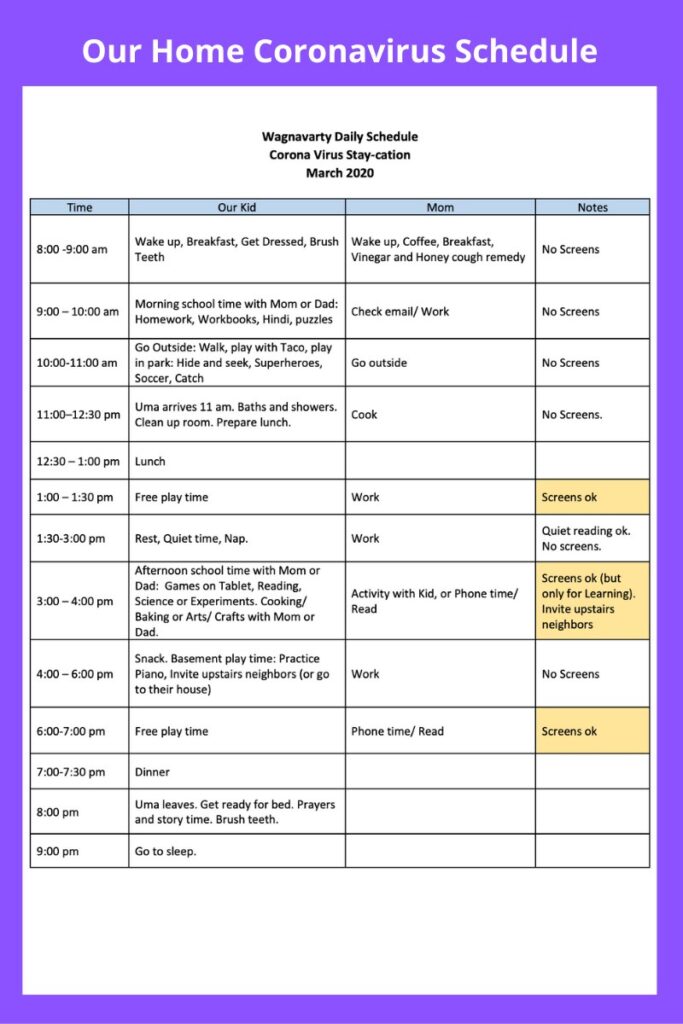
Tip #6: Regularly monitor how your kid is processing any worry or anxiety.
Here are a few tips based on the questions I ask myself as I monitor how my daughter is holding up:
- Is she reacting any differently to how she usually reacts to day to day life?
- Is there anything different about her body language, tone of voice, and breathing?
- Is there any change in her appetite? What she’s now eating or not eating?
- Is she suddenly experiencing head, stomach, or body aches?
- Is she experiencing any new problems sleeping, crying more, or nightmares?
- Is she regressing in any other ways, in terms of potty training or sleeping through the night?
The big take-away tip for all of us is to reassure our kids continually they can come to us if they are stressed or worried about anything. In our home, we explain that it’s normal to feel stressed and worried from time to time, but the good news is that you don’t have to experience these emotions alone, and these feelings won’t last forever.
Tip #7: Do not blame or stigmatize others
Remember adults, our kids are watching, and learning from our every action. During a crisis, there’s a tendency in society to associate a person’s race, ethnicity, religious background, or sexuality with the crisis. We must avoid language that blames or stigmatizes others. Remind your kids that all types of bullying and xenophobia are wrong. For older kids, this might also be an excellent time to explain that the root causes of racism, bullying, and hate crimes are fear. If you are your child have experienced discrimination or harassment because of the COVID-19 virus, please contact your local authorities for support. We must report such behavior.
Tip #8: Be ready to answer questions about kids getting sick.
Our first reaction to this question might be to reassure our kids they won’t get sick. But that’s not the truth and is misinformation about what the virus is and how it spreads. Here are a few tips to help you with this inevitable question:
- There’s help for those who are sick. Reassure your kids that doctors, nurses, health care workers, and scientists are working hard to provide health care and take care of those who test positive for the virus.
- Kids are less likely to catch the virus. From what we know about the virus at this point, kids are less likely to contract the virus than adults. While it’s possible for kids and infants to become sick, most of those infected are adults.
- Symptoms of the virus are milder for kids than adults. Again, from what we know about the illness, the symptoms for kids are milder than they are for adults.
- Share with them how the virus affects the body. Let your kids know it feels like the flu or catching a cold. You can remind them of a previous time they’ve experienced the flu or cold as a reference point. Specific symptoms experienced by children include a runny nose, cough, and fever.
Tip #9: Honesty is the best policy when it comes to the question of death.
My daughter’s question is a tough one. My answer to her, following the tips above, went something like this: “Yes, some people will die, but most people will be ok. Most of those who do die will be older or are already sick. Grandma and Grandad are taking care of themselves just like we are. Doctors and hospitals are close by and ready to help them if they do get sick. And yes, we can Skype them tomorrow to see how they are doing.” Of course, all of us have to decide for ourselves how to respond to our kids. My advice is to keep it as short, as truthful, and as reassuring as possible.
Tip #10: It’s ok if you don’t have all the answers.
This isn’t an easy time for us or our kids. Your kids may have a lot of questions or a few; either way, more than likely, at some point, their questions will stump us. It’s perfectly ok to admit you don’t know the answer and either you’ll find out for them, or in some cases, it’s an impossible question to answer. I can remember growing up and being painfully aware when an adult wasn’t sharing the truth because they didn’t know the answer. I also remember as an older kid appreciating adults who could admit when they didn’t know the answer to a question. To help all of us, if there’s something about the virus you’re not sure about, I strongly suggest you rely on information from reliable sources. Here are four I trust: Indian Ministry of Health and Family Welfare, US Center for Disease Control (CDC), the World Health Organization (WHO), and United Nations International Children’s Education Fund (UNICEF). All four of these sources have all the essential information you need, including advice on how to talk about COVID-19 with kids.
Conclusion
Like it or not, we are living through a significant event in history. I’ve found that having a plan helps me respond to my daughter’s questions and needs. Otherwise, I’m coming up with answers and explanations without thinking about my responses. Maybe the best tip related to all the others is to check in with our kids regularly. Maybe daily. We are all learning more information about the virus all the time. And again, let them lead the conversation, there’s no point in adding more to their worries. Last, continually reassure them they can talk to you and share whatever they are feeling. The big point is, our families will get through this together, and none of us have to go through this alone.


